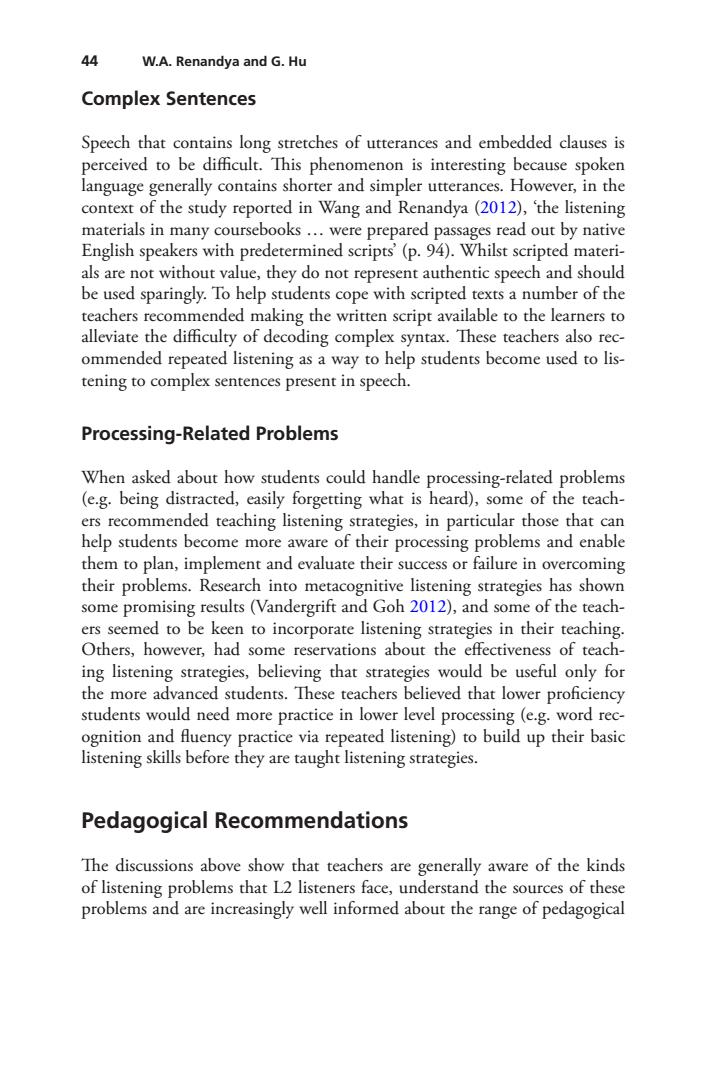正在加载图片...

44 W.A.Renandya and G.Hu Complex Sentences Speech that contains long stretches of utterances and embedded clauses is perceived to be difficult.This phenomenon is interesting because spoken language generally contains shorter and simpler utterances.However,in the context of the study reported in Wang and Renandya(2012),the listening materials in many coursebooks.were prepared passages read out by native English speakers with predetermined scripts(p.94).Whilst scripted materi- als are not without value,they do not represent authentic speech and should be used sparingly.To help students cope with scripted texts a number of the teachers recom nended making the written script available to the learners to alleviate the difficulty of decoding complex syntax.These teachers also rec- ommended repeated listening as a way to help students become used to lis- tening to complex sentences present in speech Processing-Related Problems When asked about how students could handle processing-related problems (e.g.being distracted,easily forgetting what is heard),some of the teach ers recommended teaching listening strategies,in particular those that can help students become more aware of their processing problems and enable them to plan,implement and evaluate their success or failure in overcoming their problems.Research into metacognitive listening strategies has shown some promising results(Vandergrift and Goh 2012),and som of the teach ers seemed to be keen to incorporate listening strategies in their teaching Others,however,had some reservations about the effectiveness of teach- ing listening strategies,believing that strategies would be useful only for the more advanced students.These teachers believed that lower proficiency students would need more practice in lower level processing(e.g. word rec ognition and fluency practice via repeated listening)to build up their basic listening skills before they are taught listening strategies. Pedagogical Recommendations The discussions above show that teachers are generally aware of the kinds of listening problems that L2 listeners face,understand the sources of these problems and are increasingly well informed about the range of pedagogical44 W.A. Renandya and G. Hu Complex Sentences Speech that contains long stretches of utterances and embedded clauses is perceived to be difcult. Tis phenomenon is interesting because spoken language generally contains shorter and simpler utterances. However, in the context of the study reported in Wang and Renandya (2012), ‘the listening materials in many coursebooks . were prepared passages read out by native English speakers with predetermined scripts’ (p. 94). Whilst scripted materials are not without value, they do not represent authentic speech and should be used sparingly. To help students cope with scripted texts a number of the teachers recommended making the written script available to the learners to alleviate the difculty of decoding complex syntax. Tese teachers also recommended repeated listening as a way to help students become used to listening to complex sentences present in speech. Processing-Related Problems When asked about how students could handle processing-related problems (e.g. being distracted, easily forgetting what is heard), some of the teachers recommended teaching listening strategies, in particular those that can help students become more aware of their processing problems and enable them to plan, implement and evaluate their success or failure in overcoming their problems. Research into metacognitive listening strategies has shown some promising results (Vandergrift and Goh 2012), and some of the teachers seemed to be keen to incorporate listening strategies in their teaching. Others, however, had some reservations about the efectiveness of teaching listening strategies, believing that strategies would be useful only for the more advanced students. Tese teachers believed that lower profciency students would need more practice in lower level processing (e.g. word recognition and fuency practice via repeated listening) to build up their basic listening skills before they are taught listening strategies. Pedagogical Recommendations Te discussions above show that teachers are generally aware of the kinds of listening problems that L2 listeners face, understand the sources of these problems and are increasingly well informed about the range of pedagogical